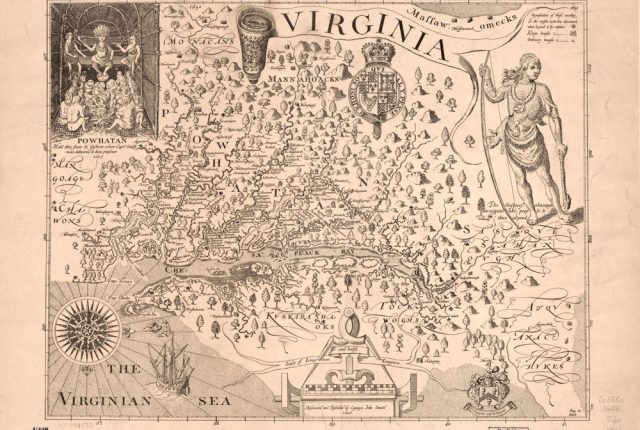
Date/Time
Friday, April 17, 2020
9:00 am PDT – 3:30 pm PDT
This event is has been adapted to a one day online event. Speakers will present online via a Zoom Webinar, attendees will have multiple options to watch and listen in.
Zoom access instructions for this conference will be sent to registered attendees. Please register for this online conference by completing the Booking Form below.
—organized by Brenda E. Stevenson (University of California, Los Angeles) and Sharla M. Fett (Occidental College)
The year 1619 was designated as the red-letter year in Virginia, the first permanent colony in British North America, for three reasons—it marked the beginning of a representative government; the arrival of captive African laborers; and the initiation of a successful plan to encourage permanent family development through the importation of English women. It was on June 29, 1619, that Sir George Yeardley, governor general of the colony, convened a legislative assembly consisting of persons sent as representatives by its free male residents. It was the first such legislative assembly in the British colonial New World. Two months later, the first shipment of Africans arrived at Point Comfort on the southern coast of Virginia, a foreshadowing of the hundreds of thousands of African laborers who would eventually arrive and help to transform Virginia, and several other colonies, into race-based-slave economies. That same year, the Virginia Company of London began a concerted effort to recruit “respectable [English] women” to the colony so that, in the words of one Company officer, they could “‘make wifes to the inhabitants and by that meanes to make the men there more settled and less moveable.” The combination of these efforts, all meant to enhance the lives of the colonial male elite, marked the beginning of a true settler colony for Britain in North America. This beginning came with grim implications for the indigenous populations the British encountered. These experiments in governance, settler colonialism, and a racialized economy also proved to be the characteristic underpinnings of our independent nation two hundred and fifty years later. 1619 was indeed the red-letter year of British America’s 17th century!
The 2019–20 core program, which marks the 400th anniversary of this notable year, encompasses three conferences, each of which will address one of the three seminal events of 1619 within the geopolitical, economic, and social/cultural contexts of 17th and 18th century North America. Across these conferences, we will also consider 1619’s impact on the nation’s eventual character. The British, of course, were not the first Europeans to explore, establish permanent settlements, import African slaves, or create governing structures in North America. The French and the Spanish made several forays into the southern, gulf, and western regions before the British. Therefore, the program will also encompass French and Spanish forays into the southern, gulf, and western regions.
The third conference will focus on the arrival, coercion, commodification, and resistance of native, English, and African women. Scholars will consider colonial women’s labor, and their evolving status within families and communities. Discussions will engage the problems and possibilities of a colonial archive that has traditionally been constructed by, and centered on, a white, elite patriarchy to the exclusion and/or marginality of the voices and divergent experiences of women, Africans, native peoples, and non-elite whites.
Speakers
Daina Ramey Berry, University of Texas at Austin
Kathleen M. Brown, University of Pennsylvania
Erica Armstrong Dunbar, Rutgers University-New Brunswick
Sharla M. Fett, Occidental College
Jessica Millward, University of California, Irvine
Susanah Shaw Romney, New York University
Susan Sleeper-Smith, Michigan State University
Lisa Sousa, Occidental College
Brenda E. Stevenson, University of California, Los Angeles
Lorena S. Walsh, Colonial Williamsburg Foundation
Online Program
Friday, April 17, 2020
All listed times are Pacific Daylight Time
9:00 a.m.
Brenda E. Stevenson, University of California, Los Angeles
Sharla M. Fett, Occidental College
Opening Remarks
9:15 a.m.
Panel 1: Family and Patriarchal Authority
Chair: Brenda Stevenson, UCLA
Kathleen M. Brown, University of Pennsylvania
“Colonizing Women: Women’s Labor in Colonial North American Spaces”
9:40 a.m.
Susanah Shaw Romney, New York University
“Intimacy and Empire in New Netherland”
10:05 a.m.
Jessica Millward, University of California, Irvine
“Archives of Intimate Violence and Legibility in Eras when Enslaved and Free Black Women’s Bodies Mattered”
10:30 a.m.
Discussion
10:50 a.m.
Break
11:00 a.m.
Panel 2: Gender, Race, and Labor
Chair: Sharla Fett, Occidental College
11:05 a.m.
Susan Sleeper-Smith, Michigan State University
“The Agrarian Village World of Powhatan Women”
11:30 a.m.
Erica Armstrong Dunbar, Rutgers University
“Working for the Washingtons: Enslaved Girls at Mount Vernon and Beyond”
11:55 a.m.
Lorena Walsh, Colonial Williamsburg Foundation
“Public History and the History of Female Labor, Family, and the Community in the Early Chesapeake”
12:25 p.m.
Discussion
1:00 p.m.
Lunch Break
2:00 p.m.
Expert Roundtable: A Conversation on Accessing and Assessing the Archives Across Generations
Co-Chairs: Brenda Stevenson, University of California, Los Angeles and Sharla Fett, Occidental College
Lisa Sousa, Occidental College
“Contesting Patriarchy: Views from the Colonial Mexican Archive”
Daina Ramey Berry, University of Texas at Austin
“Gatekeepers of History Establishing Silences in the Archives”
Brenda Stevenson, University of California, Los Angeles
“Social History of the Early South Across Race, Class, Gender and Cultural Narratives.”
Sharla Fett, Occidental College
“Fragments and Ventriloquism: African Women Recaptives in the Archives of Transatlantic Slave Trade Suppression”
3:00 p.m.
Discussion
3:30 p.m.
Conference Concludes
Music from webinar: Dvorak – Serenade for Strings, op 22 in E Major: larghetto by Advent Chamber Orchestra
There is no charge for this event. Advance booking is requested.
Booking Form
Bookings are currently closed for this event.

